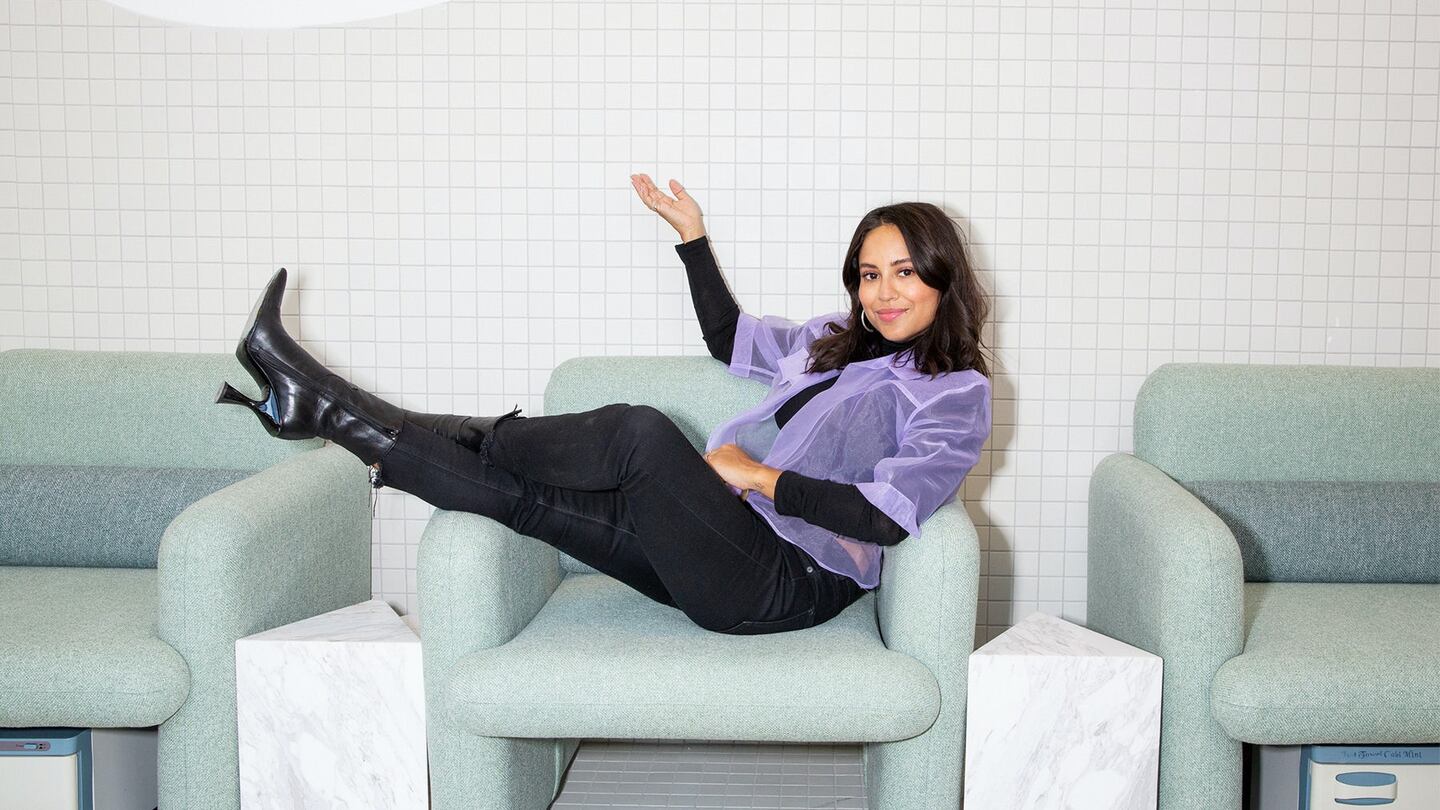
The Business of Fashion
Agenda-setting intelligence, analysis and advice for the global fashion community.

Agenda-setting intelligence, analysis and advice for the global fashion community.

NEW YORK, United States — When Ariane Goldman launched the maternity clothing start-up Hatch Collection in 2011, she made herself (at the time pregnant with her first daughter) the face of the brand.
She gradually faded into the background as Hatch grew, with professional models taking the place of candid photos of Goldman and her growing family. But in the early days of the pandemic, Goldman reemerged. She’s spent the last few months posting at-home try-on videos and introducing new products directly to the brand’s 138,000 Instagram followers.
“It feels really good to … connect directly with people because right now connection is what we're all looking for,” Goldman said.
Many consumers these days want to feel a connection to the brands they shop. For many, particularly venture-backed start-ups looking to quickly build a big following, a relatable founder is a reliable shortcut. If done right, a magnetic personality who seems to share his or her customer’s values can sell products just as well as a promotion or an ad blitz on Instagram.
ADVERTISEMENT
In 2020, brands are leaning even more heavily on their founders to lend credibility as they reacted first to the pandemic, then to the killing of George Floyd, protests against systemic racism and police violence. It's no coincidence that some of the most effective demonstrations of solidarity with the protestors this week have come with a founder's signature at the bottom. Messages from brands that appeared to lean more heavily on the public relations filtration system tended to ring hollow.
No one believes that you only wear your own label.
To be sure, many of those heartfelt letters from founders likely went through layers of vetting by publicists. Not everyone who starts their own company wants to be its spokesperson and part-time model too. And some who do probably would be serving their start-up better by staying behind the scenes. This week, more than one brand has been called out by former employees for failing to live up to the lofty ideals they expressed on Instagram.
Still, making a brand’s founder accessible to customers may be the generator that powers it through this and other crises.
“Expressing the importance of connection right now to founders ... is almost imperative to survival,” said Melissa Duren Conner, co-founder of Jennifer Bett Communications. “You have to think about the founder and their comfort level, what's going to make them shine. If they don't feel comfortable ... that's gonna only backfire.”
No Such Thing as a Perfect Founder
A brand leader doesn’t have to be perfectly polished to present themselves to the public.
When Sarah Larson Levey launched Y7 Studio, the high-energy exercise club in 2013, she felt pressure to embody what she imagined an urban-dwelling, Instagram-ready wellness brand founder looked like.
“Early on when I would do interviews or shoots, I felt like I had to be this picture of health: Green smoothies every day, have a 10-step morning routine and look like a stock image of a yoga instructor,” she said. “The truth is, that’s not me. Once I stopped trying to fit into this mould and avoid mistakes … I found it much easier to find my voice and place as the face of the brand.”
ADVERTISEMENT
Matthew Growney, a venture capitalist and brand consultant, advises founders to share who they are and why they believe in their business. Hawking products should never be the goal, at least on their personal social media feeds.
“No one believes that you only wear your own label,” he said.
Cyndi Ramirez, founder of the spa and lifestyle brand Chillhouse, often posts broader content about home design and fashion that has little directly to do with self-care. That’s helped her secure brand partnerships and build her personal following, increasing exposure for Chillhouse.
Founders need to be aware that they are inviting customers to scrutinise their personal lives, which won’t always reflect well on their brand. They need to be open with publicists and media consultants early on about any potential red flags in their background, so they can get ahead of potential scandals. JBC vets every founder it works with as if they will someday be public-facing, Duren Conner said.
Beyond Instagram
A well-cultivated Instagram feed isn’t the only way founders can connect with their customers.
At the outset of the pandemic, Fe Noel, founder of her namesake contemporary fashion brand, held Zoom calls with her most loyal clients and engaged followers. They discussed their feelings and gave feedback on the brand.
“We need a space where we can talk to other like-minded women, and sometimes we don't know we're like-minded,” Noel said. “But we know that we're buying the same clothes, so some of our thinking and our style is similar. So, let's connect on other levels beyond the clothes as well.”
ADVERTISEMENT

Taran and Bunny Ghatrora | Source: Courtesy
Lauren Chan, founder of the plus-size womenswear brand Henning, sent individual emails to customers at the outset of the pandemic to explain shipping delays. She saw it as a way to reinforce the sense of community her brand has always tried to foster.
“All the messages that we got back were completely understanding and forgiving, and actually most of those messages included a pep talk or a supportive comment,” Chan said.
LinkedIn and Medium are also useful platforms to communicate opinions and values.
Sister duo Taran and Bunny Ghatrora at skincare brand Blume opt for private Facebook groups and monthly calls with the brand’s most engaged community members. Customers are encouraged to speak freely and provide feedback about what’s resonating with them.
Meeting the Press
When doing press, founders and their publicists should ask first what they’re trying to communicate.
“That question is really what will help guide the decision on who to speak with and how,” said Clara Jeon, co-founder of communications and consulting firm Chapter 2.
An interview with a mainstream outlet can lend credibility to a founder’s views on an issue they are passionate about, Jeon said.
“A publication’s reputation and responsible journalism still really matter because brands and individuals will leverage it to amplify their own influence and legitimise a message,” she said.
This is the DNA of my clothes, and I am the person to sell it.
When launching a new product, founders might branch out more, speaking with niche media that target specific groups they hope will become customers.
Noel, who doesn’t regularly work with a publicist, said she is selective about the press she works with, as many outlets pigeonhole her as a black fashion brand founder, and focus less on the products themselves.
“You always have that question like, ‘If I wasn't black, would I have gotten this?’ when we’re trying to get an interview or trying to get someone to come to our studio to look at our clothes,” she said. “I got to the point where I didn't care, and I was like this is who I am. This is what I'm selling. This is the DNA of my clothes, and I am the person to sell it.”
Connection Failure
When a founder positions themselves more publicly, they must be prepared for the extra scrutiny. Not every post needs to be filtered through a publicist, but it may be useful to have a sounding board — especially lately.
“Founders that are shooting themselves in lavish settings during Covid, or founders pressing customers to buy new products in periods when we are dealing with much greater social issues like police brutality … [that’s] tone deaf,” Growney said.
Albert Ayal, founder of ASquared Communications, said that he and his client, Adina Kamkhatchi of Adina’s Jewels, have been “hyper-aware” about how Kamkhatchi appears when she posts on the brand’s Instagram page.
Kamkhatchi alternates between posting different kinds of serviceable content — posts about the brand’s charitable giving efforts to video tutorials about how to clean jewellery, that Kamkhatchi hosts — to the brand’s page as well as her personal account.
“We want to make sure that Adina is showing her personality without the whole glamorous life, because [during the pandemic] is a time to be very sensitive,” Ayal said.
Consumers also expect brands to engage with political issues, but even that has its limits. Ramirez regularly posts to her personal Instagram page about a variety of political issues, ranging from immigration to abortion rights. She’s less outspoken on Chillhouse’s official account, however.
“I really want people to feel like [Chillhouse is] an escape,” Ramirez said.
Founders should be cautious about “reposting or regurgitating misinformation,” Jeon said. “[Don’t] post anything that makes a social or political statement without doing your due diligence in research and conversations with people of varying opinions and points of view.”
Set Personal Boundaries
Many of the founders who spoke to BoF said being “on” for customers can be draining.
“Making myself so open and susceptible is also taxing on me,” Henning’s Chan said. “The negative comments hurt twice as much, the good ones feel better than I can tell you. I spend a lot of extra time personally communicating with our community and customers and it's something that I want to be doing, but you know that's time that I could be spending doing something else for the business.”
The best way to avoid burnout is to set boundaries. As Blume has scaled, Bunny Ghatrora said she and her sister schedule time to respond to customers, and delegate communications outside those hours to other team members.
“We can only be as great of a company as our customers think that we are...so it's important to hear from them,” she said.
"I think it’s always hard to put yourself out there as the face, [since] you become the focal point for everything, good or bad,” said Larson Levey. “My experience has taught me to always do your best and operate as transparently as possible.”
Related Articles:
[ As Brands Rush to Speak Out, Many Statements Ring HollowOpens in new window ]
[ How to Avoid the Greenwashing TrapOpens in new window ]
[ Where to Put Your Marketing Dollars Right NowOpens in new window ]
The designer — whose bright, arty clothes earned him a place in the 2021 LVMH Prize Finals, and a guest designer post for Louis Vuitton — curated a set at the Netflix Is a Joke Festival this weekend, the latest example of his creative approach to building brand awareness.
Practitioners of this historically behind-the-scenes profession are building powerful followings, riding a wave of interest in how the fashion sausage is made. But even the highest-profile PRs caution that the client still has to comes first.
Join us for a BoF Professional Masterclass that explores the topic in our latest Case Study, “How to Create Cultural Moments on Any Budget.”
When done effectively, a cultural partnership can rightfully earn its own place in the zeitgeist. But it’s not so easy as just hiring a celebrity to star in an ad campaign; brands must choose a partner that makes sense, find the format that fits best and amplify that message to consumers.